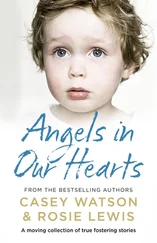“I’ll call if it’s late,” my mother says, heading for her car. Her slips shows a little, but these days it’s charming.
I wish sometimes that I were the one saying those words, that she were the one a little desperate for my attention. These days I am an actor trying to play a real person; I get all the lines confused.
In the living room, I settle in for the night with a glass of wine and near-stale potato chips I find forgotten in the back of the kitchen pantry by the briquettes. This is how it’s been for weeks now. I don’t need the TV Guide anymore to tell me what’s on each night. Most nights I lose myself in the endless loop of half-hour shows. Lately I’m trying to limit myself to the shows I really like, the ones I think I can learn something from: a girl who comes to realize that her brother is envious rather than just plain mean, a father who learns that his goals for his daughter may be different from his daughter’s goals. My goal is to watch only the ones that I can apply to my life, though I haven’t figured out yet which ones those are.
On the coffee table there’s an old photo album that my mother brought down from where it was folded into towels in the linen closet by the bathroom. She brought it down so that I could look at pictures of myself as a baby, pictures of me learning to walk, climbing up on the toilet, mouthing baby food from a spoon. I suspect that she wanted to show me these pictures because they are evidence that I have accomplished something and that, quite possibly, I will accomplish something again. What interests me, however, are the pictures of my mother. She is slimmer and wears sleeveless dresses that end above her knees. In one picture, five years younger than I am now, she looks coyly out from behind her wedding veil while her mother stands in the background feigning irritation. The picture that I always return to is the picture of my mother at age thirty-three in a dashing, jaunty hat. She sits on a park bench with pigeons at her feet. Her head is turned, and the profile of the long slope of her nose, like a gentle root erupting, is the center of the picture. She looks so sure of herself that it makes me wonder how she got that way.
When I lived at home before, my mother wore a clouded face full of apology — sorry dinner is late, sorry your father is dying, sorry for always being sorry. Now she is dashing once again like the picture, dropping her keys on the way to the car, wiggling her hips playfully as she bends to pick them up. In that picture, I am an idea that she will have a year later.
I hear a rustling on the front porch, the sound of scratchy polyester pant leg against scratchy polyester pant leg, and there is Raymond from across the street — timid, as if he weren’t a regular guest when my mother is not here. Raymond is a little bit in love with my mother. When Raymond first moved into the house across the street, she invited him to dinner. He left a small bite of each thing — carrots, mashed potatoes, chicken — on his plate at the end of the meal, an offering, and he didn’t say a word. Now when Raymond and my mother see each other from across the street or pass on the sidewalk, Raymond looks down, nods his head quickly in restrained acknowledgment of what my mother will never offer him. He likes to come over and occupy the space where my mother was or will be soon again.
“What’s on TV tonight?” Raymond asks. He’s told me that he doesn’t have a television, but twice when I was locked out and went over to use the phone I saw the inside of his house, the exact opposite of ours, with the stairway to the left instead of to the right. Raymond’s house does not have very much furniture, but it does have a sofa and a television that remained on and unwatched both times I used the phone.
“Come in,” I say. I am not threatened by Raymond because of his crush on my mother. He was not around when I was growing up in the neighborhood, and we don’t know much about him except what we see as the people who live across the street: he looks slightly older than my mother because he tries to hide his gray hair with a thick black formula; he washes the same set of dishes every night (this detail we guess), holding them up to the light in his window to make sure they are clean; and he checks his mail three times a day although the postman comes only once, at three in the afternoon. My mother often wonders aloud whether he is waiting for a winning sweepstakes or a letter from someone who has never written him before, because he never seems to get any mail or send any letters himself. Some days when we see him heading down his grassy slope to the mailbox with the American flag painted on it, my mother will say in a dramatic, drumroll sort of voice, “Could it be the winning sweepstakes?” She has that kind of energy.
Even though I am not threatened by Raymond, I turn on the light in the living room where the TV has been casting patterns of light on the wall. After he fixes himself a scotch and soda, Raymond takes a seat on one end of the couch and I take my old place near the other end. When Raymond comes over, I choose what we watch randomly and for the first half hour we do not speak, not even during the commercials. Flickering images fill our eyes until, after the first family plot in which a wayward daughter does right, Raymond speaks about my mother.
“I was thinking about telling your mother about the boy who comes to do my yard,” he says tonight. “I was thinking that she might want him to do your yard too. The boy has a nice touch.” From the table he picks up the picture of my mother looking out from behind her bridal veil. “That’s a pretty picture,” he says, crunching ice, and then we watch family plot after family plot until the ten o’clock news.
“How’s your grandmother?” Raymond asks, a little of his drink spilling over the side of the glass as he raises it to his lips. Raymond doesn’t know my grandmother, but he asks the question as if he is a friend of the family. It seems out of the blue, but he’s looking at a picture of me, my mother, and my grandmother, standing in that order in front of a ride at the local fair. The ride is called the Twister, comprising two baskets that twirl like eggbeaters. A girl in my junior high class threw up while the ride was going full speed. In the picture, the three of us are pretending to be dragged toward the stairs to the Twister as if by some invisible force. My grandmother has placed her panama hat on the ground several feet away, as if the invisible force has blown it off and it landed there. My mother and I have our hands above our heads, eyes bugged. Behind us all, the Twister is a mere yellow blur, people strapped to the sides of the baskets, trying to resist its pull and twist.
“She’s been dead for years,” I say, remembering the way my mother was sorry about that too. My grandmother was unhappy with my mother in the end for losing her husband to an illness. She was upset that there was a pause in my mother’s life after my father died, as though by taking too deep a breath, my mother might have passed out.
“Hmm,” Raymond grunts thoughtfully, not particularly regretting the question. When the news is over, Raymond rises to leave. He takes his glass into the kitchen and then stands in the living room for a minute, looking at the picture of me, my mother, and my grandmother.
“The Twister?” he asks, pointing at the yellow blur though he is looking at my mother. “You all look alike,” he says, running his finger along the row of us.
I slide down the couch to look, and it’s true, we do. We are variations on a theme: the same thin hair and saucer eyes, the same exaggerated poses and looks of mock astonishment. I’m not sure why I’m so suprised. I’ve looked at these pictures over and over again since I’ve been home, but Raymond’s looking at them has made me look again — the way he searches my mother’s image for the source of her magic.
Читать дальше












